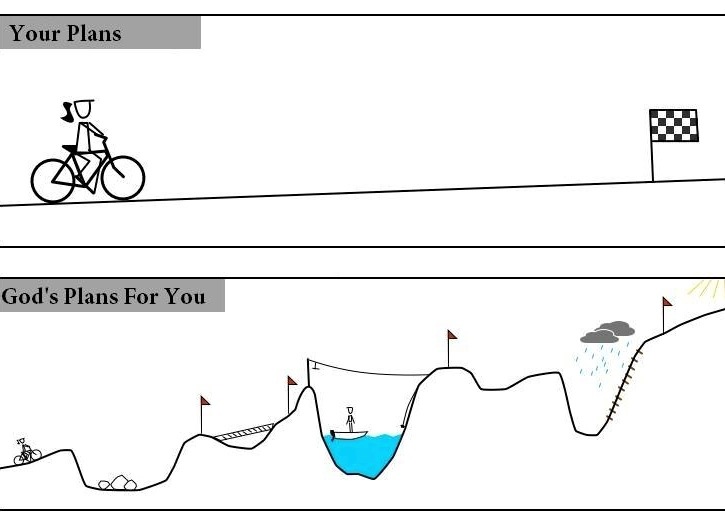“Remember in the darkness what you have learned in the light.” I remember this little piece of wisdom being imparted to us when we were in Bible school. Just recently, our pastor challenged us with the same thing in regards to our feelings about the Lord’s trustworthiness, loving care and provision in light of our present circumstances.
As you know, our lives have been turned upside down. We never imagined to move in the direction we had to serve among the Tigak people in Papua New Guinea, to make the sacrifices we have made (together with many of you from the financial and prayerful standpoint) in being over there and spending the last couple of years learning the language and culture and building relationships, with the hope of remaining faithful to the church to see it brought to maturity, only to have it all stripped away long before “completion.” We never imagined that we would leave the Tigak people, leave our co-workers who we have labored side by side with and leave our greater mission family within Papua New Guinea.
We are struggling to process this loss. We had visions of what the future would look like, plans that were prayerfully made before the Lord, a sense for what our ministry would look like, how we would practically fulfill the Great Commission among the Tigak, a sense of fulfillment in our station, and a sense of identity in who God made us to be on our team in assessing the needs of the Tigak church.
Gone.
We are struggling to make sense of it all.
Reflections from the Book of Job
I was studying through the book of Job a while back. The book of Job, which is commonly believed to have been the first book of the Bible written, contains the details of a man encountering extreme suffering, suffering I have never known the likes of and few on this earth have ever experienced. He lost his livelihood, his children, his wife, and even his physical health. Then to top it off, he suffered at the hands of several misguided friends who wrongly interpreted his experiences for him.
Some important things stood out to me as I meditated on my study through this lengthy read comprised mainly of speeches, as it relates to hardship.
 For one thing, I noticed that the majority of the book of Job is not actually about him grieving the loss of his family, livelihood and health. In fact, the focus of the majority of the book is him essentially wrestling with the meaning of his suffering, or rather how it should be interpreted especially in light of his so-called friends telling him that his suffering is the result of God’s judgment, something the reader knows is not the case because of the story’s introduction.
For one thing, I noticed that the majority of the book of Job is not actually about him grieving the loss of his family, livelihood and health. In fact, the focus of the majority of the book is him essentially wrestling with the meaning of his suffering, or rather how it should be interpreted especially in light of his so-called friends telling him that his suffering is the result of God’s judgment, something the reader knows is not the case because of the story’s introduction.
On the one hand Job felt that he had done nothing wrong before the Lord; his conscience was clear. On the other hand, his circumstances and his friends argued for judgment from the Lord. I only say his circumstances argued for judgment because I think its the natural human inclination to interpret them that way, not because they necessarily should be. (And of course, as we know in Job’s case, it wasn’t judgement for wrongdoing.)
Job wrestles with understanding who God is, why He has allowed this to happen, if He is good, if He is just, if He is fair, if He is loving. At one point, Job feels so strongly that he has not done anything wrong and that if his friends are right, it only means that God is the one who is not fair. This sounds bad to the reader, but if there’s one thing we can glean from Job is that God can handle being questioned.
In any case, I can appreciate this tension of how to interpret hardship before the Lord. I have found that it is easy to allow difficulties, and our emotional response to them, to thrust us into questioning what we understand about God in His relationship to us.
 I can also appreciate that the book is not entirely him grieving his loss, but rather wrestling to understand the character of God in relationship to him, because for me the question always seems to evolve from, “What has just happened to me?” to the more profound inquiry, “Is God trustworthy?” which is actually just the face of a much deeper longing, that is to know, “Am I really cared for by God?”
I can also appreciate that the book is not entirely him grieving his loss, but rather wrestling to understand the character of God in relationship to him, because for me the question always seems to evolve from, “What has just happened to me?” to the more profound inquiry, “Is God trustworthy?” which is actually just the face of a much deeper longing, that is to know, “Am I really cared for by God?”
Philip Yancey in his book Disappointed with God makes the case that the book of Job, commonly understood to be a book about suffering, would be better understood to be a book about faith. Its interesting to note in Job that while he does question the character of God (and receives heavy correction from Him at the end), he never actually curses God or abandons Him, like his wife. Even Job’s questions are born out of faith in God. At his lowest, he actually never gives up on God altogether. Even in his darkest moments, of sickness, suffering at the hands of his friends’ bad theology, and deep doubt, he never abandoned God. He trusted Him.
What We Have Learned in the Light
The Word itself, illuminated by God’s Holy Spirit, testifies to the goodness of God, His provision in Christ, how He sees us in Christ, and His ability to sustain us and supply all of our needs. But what about what we experience in our lives? Do our lives and experiences testify to what the Bible teaches? To “know” is to have learned what God says, but to “be wise” is to have learned its application in our varied circumstances.
What He Thinks of Me
Its one thing to affirm the truths of our identity in Christ, to know what He says about us in Christ, and quite another to apply them to ourselves in times of need.
I vividly remember the grace of of God overwhelming me to the point of tears when I first understood what Christ had done for me on the cross. I was loved by God; forgiven because of Christ. It was for me.
 Since that time, I have only become more acutely aware that His love, and His care for me in this life only becomes more and more magnified when compared to how much further and more deeply I come to grips with the reality of my indwelling depravity. I thought I understood the gospel when I first believed. Now I understand it more deeply then ever, and will continue to grow in my ability to grasp it and let my life be lived as a response to it out of a heart of gratitude and worship.
Since that time, I have only become more acutely aware that His love, and His care for me in this life only becomes more and more magnified when compared to how much further and more deeply I come to grips with the reality of my indwelling depravity. I thought I understood the gospel when I first believed. Now I understand it more deeply then ever, and will continue to grow in my ability to grasp it and let my life be lived as a response to it out of a heart of gratitude and worship.
We are told in the Bible that we are loved, accepted, cared for, will never be abandoned. Is that true for me right now? When I consider the goodness of God, all I have to do is remember who I was before coming to Christ, and what God says about who I am in Him.
What He Has Done for Us
When I consider the goodness and loving kindness of God, I also remember His past provision. I began to write out each instance of His provision, but the list became far too long, and was riddled with episodes of weeping. But let me just say, we have many examples of the following truths, our “pillars of remembrance” so to say, (with highlights below for those who remember with us):
- He has always provided for us, even when we trusted Him for astronomical things
- Bible School, Cambodia Trip, Missionary Training, Moving to PNG, Living in PNG, One Time expenses (moving costs, generator, boat motor, conferences), Monthly Expenses
- He has always encouraged us through His Word and His church in times of desperation
- Cambodia, Support Raising, Moving to PNG, Struggling in PNG
- He has guided our family through His Word, wise counsel and through open & closed doors
- Training, Cambodia, Serving in PNG
- Every hardship He has allowed in our lives we now look back and are thankful for them
- An Extra Year Before Training, Support Raising, Cambodia, Serving in PNG
 All of these amount to one very important truth: He has proven Himself to be trustworthy; worthy of our trust. Every single detail mentioned above is its own story of the Lord’s faithfulness to our family. As I mentioned before this list is much longer. We have never chosen to lean on Him and then be left to fall. We have never been tricked by Him. This is what we remember in the darkness. Past faithfulness on His part argues for present trust on our part.
All of these amount to one very important truth: He has proven Himself to be trustworthy; worthy of our trust. Every single detail mentioned above is its own story of the Lord’s faithfulness to our family. As I mentioned before this list is much longer. We have never chosen to lean on Him and then be left to fall. We have never been tricked by Him. This is what we remember in the darkness. Past faithfulness on His part argues for present trust on our part.
Our hardships right now severely pale in comparison to Job’s suffering and hopefully you understand that I am not attempting to equate the two. However, when I think about the book of Job, and I think about the chaos of difficult circumstances, I am reminded that the real challenge in life and in hardship is not necessarily doing the right thing, but believing the right thing, actually trusting in the right One. This is important because a trusting heart becomes a transformed heart and a transformed heart is useful to Him. Job’s faith was tested, and as I heard a pastor once share, “A test of faith is not necessarily a test of how we behave, but rather a test of what we believe.”
As we walk in darkness during this time, we seek to remember what we have learned in the light, and what we have learned in the light amounts to our ability to trust Him with everything in the midst of all circumstances.

andy says
Awesome! Thanks!!
Ruth Pontier says
Thanks SO much for these honest, ‘open’ comments, – – Still Praying Lots for you guys!! with Love –